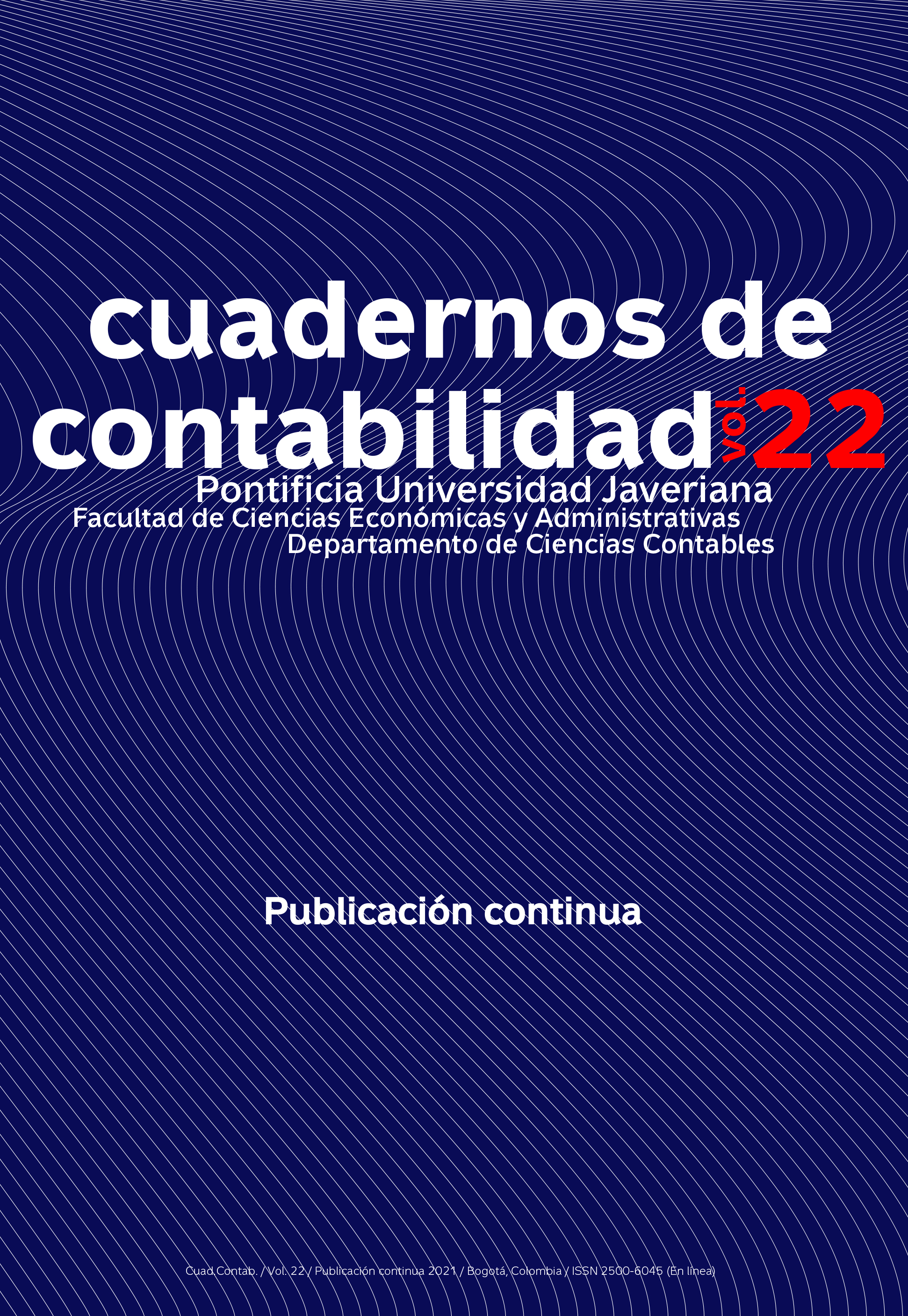Resumen
El ejercicio del profesional contable al interior de las organizaciones privadas y públicas ha tomado un rol significativo en los últimos años, pues ha migrado del contexto de la teneduría de libros a un escenario más estratégico. Sin embargo, el desempeño del contador ha sido cuestionado en el marco de su función social al ser garante de confianza pública y de manera particular del “interés público”, a través de una conducta profesional integra, una conducta ética con respeto a los principios y una garantía a la transparencia de la información financiera, que sirve para la toma de decisiones de un grupo amplio de usuarios. Este trabajo tiene como objetivo reflexionar sobre el actuar del contador en su función de garantizar confianza pública. La investigación es descriptiva con enfoque cualitativo, a partir de una encuesta aplicada a 216 profesionales seleccionados de manera no probabilística, y a quienes se les preguntó su opinión con relación a su actuar ético y su función social en las organizaciones. Los resultados evidencian por ejemplo, que el 85,3% de los encuestados están de acuerdo en que la ética de contador se ve amenazada por los intereses particulares de la empresa privada, y un 65,9% manifiesta que no se garantiza el principio de independencia mental.
Aguirre, R. J. (2012). Contabilidad: entre la responsabilidad social y el interés público. Criterio Libre, 10(17), 220-234. https://revistas.unilibre.edu.co/index.php/criteriolibre/article/view/1149
Angulo, J. A. G., & Garvey, A. M. (2009). Ética y enseñanza de la contabilidad (una propuesta de discusión). Contaduría Universidad de Antioquia, (50), 11-42. https://revistas.udea.edu.co/index.php/cont/article/view/2120
Aristóteles. (Siglo IV a.c). Ética a Nicómaco.
Backof, J. F., & Martin, C. L. (1991). Historical perspectives: development of the codes of ethics in the legal, medical and accounting professions. Journal of Business Ethics, 10(2), 99-110. https://doi.org/10.1007/BF00383613
Baker, M., & Maier, C. (eds.). (2014). Ethics and the Curriculum: Critical Perspectives. Routledge.
Bedoya, J. P., & Arroyave, J. Á. (2013). Del Contador Público y la ética profesional: un dilema inmerso en un ambiente saturado de conflictos morales. Contaduría Universidad de Antioquia, (63), 127. https://revistas.udea.edu.co/index.php/cont/article/view/24102/19727
Blanco Luna, Y. (2004). Manual de auditoria y revisoría fiscal, 8ª ed., Eco ediciones.
Bustamante, H. (2010). El interés público en la nueva base institucional de la regulación contable en Colombia. Comentarios generales a propósito del proceso de convergencia hacia estándares contables internacionales. Contaduría Universidad de Antioquia (56), 81-104. https://revistas.udea.edu.co/index.php/cont/article/view/14694/12847
Cicerón, M. T. (1818). La república. Imprenta de Repullés.
Congreso de la República. Ley 43 de 1990. Profesión del Contador Público y otras disposiciones, pp. 1-2.
Corte Constitucional (2000). Sentencia C-530 de 2000. Diario Oficial. Bogotá: Corte Constitucional – Sala Plena.
Cortina, A., Orts, A. C., & Navarro, E. M. (1996). Ética, Vol. 4. Ediciones Akal.
Davenport, L., & Dellaportas, S. (2009). Interpreting the public interest: A survey of professional accountants. Australian Accounting Review, 19(1), 11-23. https://doi.org/10.1111/j.1835-2561.2008.00041.x
Donaldson, T., & Preston, L. E. (1995). The stakeholder theory of the corporation: Concepts, evidence, and implications. Academy of Management Review, 20(1), 65-91. https://doi.org/10.2307/258887
Esteban, E. G. (2007). La teoría de los” stakeholders”: un puente para el desarrollo práctico de la ética empresarial y de la responsabilidad social corporativa. VERITAS: Revista de filosofía y teología, (17), 205-224.
Frankel, M. S. (1989). Professional codes: Why, how, and with what impact? Journal of Business Ethics, 8(2-3), 109-115.
Hernández S., R., Fernández C., C., & Baptista L., P. (1998). Metodología de la investigación (pp. 15-40). México: McGraw-Hill.
IFAC (2012). Resumen de posición de la política número 5, recuperado de www.ifac.org
IFAC (2015). Manual de Pronunciamientos Internacionales de Formación. https://www.ifac.org/system/files/publications/files/Manual-de-Pronunciamientos-Internacionales-de-Formacion-Edicion-2015.pdf
IFAC (2017). Los contadores prestan una ayuda crucial a la hora de reducir la corrupción global. El Contador Público, p. 24.
Jamal, K., & Bowie, N. E. (1995). Theoretical considerations for a meaningful code of professional ethics. Journal of Business Ethics, 14(9), 703-714. https://doi.org/10.1007/BF00872324
Leitão Azevedo, R. F., & Cornacchione Junior, E. B. (2012). Ética Profesional contable: Un análisis visual de la percepción pública. Revista de Educação e Pesquisa em Contabilidade, 6(1). https://www.redalyc.org/articulo.oa?id=441642775003
Lindblom, C. K., & Ruland, R. G. (1997). Functionalist and conflict views of AICPA code of conduct: Public interest vs. Self interest. Journal of Business Ethics, 16(5), 573-582. https://doi.org/10.1023/A:1017950006942
Maldonado, S. (2002). La contabilidad: un área del conocimiento de alto contenido ético y cultural. Cuadernos de Contabilidad, 13(16), 121-140.
Parker, L. D. (1994). Professional accounting body ethics: In search of the private interest. Accounting, Organizations and Society, 19(6), 507-525. https://doi.org/10.1016/0361-3682(94)90021-3
West, A. (2017). The ethics of professional accountants: An Aristotelian perspective. Accounting, Auditing and Accountability Journal, 30(2), 328-351. https://doi.org/10.1108/AAAJ-09-2015-2233

Esta obra está bajo una licencia internacional Creative Commons Atribución 4.0.
Derechos de autor 2021 Rafael Humberto Pinzón Alfonso, Andrés David Serrato Guana


